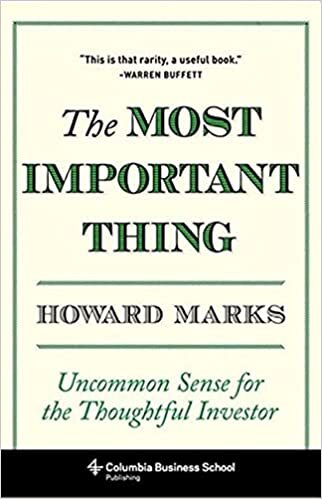September 14, 2022
Second-Level Thinking in Investing
Clients often ask us what the secret sauce is for beating the market. A lot of the time, the trick is getting out of our heads and ignoring the shouting voices of the markets, because when there is “certainty” about the right course of action, it’s usually time to do the opposite. Innate biases can also play a vital role in undermining investors’ decision-making ability, something we write and present about often (for example here, here, and here).
But aside from shutting out voices both external and internal, there is an intellectual exercise that underpins many successful investment insights, and which can mean the difference between owning great businesses and owning great stocks: second-level thinking.
Highlighted by Howard Marks in his book The Most Important Thing, second-level thinking is about viewing things differently from others in order to identify real opportunity. In this 2021 presentation to CFA Society Chicago, Marks describes it as follows: “If you think the same as everyone else, you can’t expect to outperform… In order to outperform others, you have to know something they don’t know. You have to look at things in a different way. Second-level thinking – different and better.”
But what does this look like in practice? He points to the following two examples in his book:
“First-level thinking says, ‘It’s a good company; let’s buy the stock.’ Second-level thinking says, ‘It’s a good company, but everyone thinks it’s a great company, and it’s not. So the stock’s overrated and overpriced; let’s sell.’
“First-level thinking says, ‘The outlook calls for low growth and rising inflation. Let’s dump our stocks.’ Second-level thinking says, ‘The outlook stinks, but everyone else is selling in a panic. Buy!’

Second-level thinking in Leith Wheeler portfolios
Our investment teams go through these mental gymnastics all the time, with every stock we own or consider. One recent example was in our global equity portfolio, which we manage in-house for our private clients. In the two weeks following Russia’s invasion of Ukraine in February 2022, the value of our holdings in Booking Holdings – which owns Booking.com, Priceline, OpenTable, KAYAK, and others – fell 27%. The consensus rationale was that Booking had material exposure to travel in Europe, including Eastern Europe.
First-level thinkers thus concluded, “Travel demand for the company will decline, so sales and earnings will also decline,” and sold the stock.
The Leith Wheeler global equity team’s second-level thinking went like this:
- One, Booking’s true exposure to Eastern Europe was actually smaller than a superficial glance might imply – in the low single digits as a percentage of revenues;
- Two, Spring 2022 was a period of the release of significant pent-up demand for travel, so even softness in one region would likely be overpowered by strength in others; and
- Three, Booking is exposed largely to leisure travel and is agnostic regarding where its customers want to travel. It earns a commission regardless. The big fear was that travel volumes would decline across Europe more generally and this just hasn’t happened.
These insights were corroborated by comments from Visa’s CEO about global travel volumes and data showing that US-Mexico travel was 160% of 2019 levels. Second-level thinking showed us the stock decline was not a problem. It was an opportunity.
We added to the holding, and the recovery in Booking’s business so far has been robust, with activity on the platform now exceeding pre-COVID levels. At time of writing, the stock has climbed +11% from its early March lows – versus broad market declines of -5% over the same period. It’s early days but the fact is: selling with the others at the bottom would have been a mistake.
This example highlights a commitment to fundamental analysis, to identify hidden earning power that others dismissed. Another way to think differently is by paying attention to stories that others are ignoring.
The Power of Page 16
In Investing from Page 16, we explore the idea that themes or companies that have made their way to the front page of the paper generally don’t offer attractive return profiles – because the public’s interest in them has already pushed their prices up. The returns are gone. Marks provides a salient example when his son pitches him to buy shares of Ford because of an exciting, upcoming new model launch. “How many people don’t know this?” he asks. The answer, zero, is the value he ascribes to this idea.
Conversely, investors can gain a competitive edge when they pay attention to Page 16 stories – things that seem innocuous or irrelevant, and so have garnered limited market interest (yet). As those stocks grow into their potential and hit the headlines, their valuations and stock prices will rise. Our analysts benefit from years of experience following specific sectors as well as the time to invest in understanding current conditions with competitors and customers of specific companies, which helps raise their antennae on these Page 16 stories.
Second-level thinking is a challenging but rewarding way to invest for the long term. The good news is that many views make a market, and a steady stream of first-level thinking has fed us opportunities for the last 40 years – and will hopefully continue to do so for the next 40.
Recent Posts
- Resources for Reconciliation
- Leith Wheeler: Investing in Women
- WEBINAR: Leith Wheeler in Québec
- In Conversation with Julia Chung: Advice for Your Golden Girls Era
- Leith Wheeler Establishes Montréal Office, Hires Industry Veterans Eric Desbiens and Denis Durand
- VIDEO: Leith Wheeler Outlook 2025
- WEBINAR: Home Country Bias
- Section 899: A New Cross-Border Tax Threat for Canadian Investors?
- Leith Wheeler Explainer Series: Trade Deficits
- The Leith Wheeler Podcast Playlist



